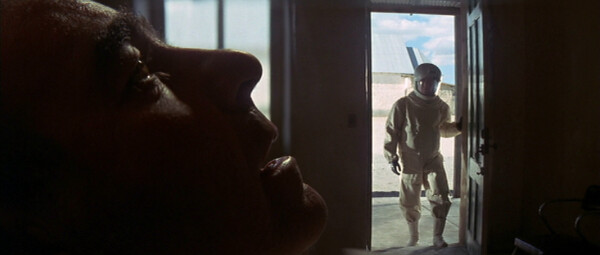Sell Out! (2008) - Yeo
The Filmbegins with sultry Rafflesia (Jessica Lai) interviewing a Malaysian film auteur for her low end TV talk show called "For Art's Sake". The auteur is Yeo Joon Han (the director making a cameo) who just won the prestigious Young Overseas Chinese Women New Directors Honorary Mention Award at the Krychindangzhongbushaus Village Far Eastern Film Festival. When asked about why his almost silent indie art film "Love is Love and Nothing Else", is so slow and boring, Yeo, who appears in the nude for the interview (and seems very comfortable), vehemently defends the authenticity of his film by citing that in real life, nothing really happens, that no one actually breaks out into a song in the middle of it. He goes on even further, stating that people who make musicals should be chopped into 18 pieces!
This prologue shows director Yeo's mischievous intentions. Sell Out! is an all-out, over-the-top satirical musical romantic comedy where many things happen and people break out into songs, many times over. And it's uproariously funny.
After capturing her lovelorn boyfriend's death on camera where he recites his poem before he dies, Rafflesia comes up with a concept for the ever-popular reality TV - a televised death. This will surely show her pretty half-English rival who the boss is. The only problem is, she has to wait by the deathbeds until her sadsack subjects croak. A potential megahit in her hand but under the tight deadline, she has to find a more reliable subject very soon. What kind of deaths are predictable? Suicides.
Enter Eric (Peter Davis), an honest engineer who works for the same greedy conglomerate that Rafflesia works for, named, ahem, Fony Corporation. He is in a pickle because the clownish corporate bigwigs can't believe their ears when they hear his 8-in-1 soy bean machine is built so well, it won't break right after its warranty runs out. How can you make money out of the product that won't break down? This is followed by musical number, "Money". They end up exorcising Eric's creative 'dreamer' side out of him, But the exorcism goes wrong, resulting in two Erics - the dreamer and the practical. Deeply depressed by all this, the practical Eric comes up with a plan involving lovely but heartless Rafflesia.
Director Yeo jabs at many things with his ironic sense of humor - snobby art film scene, money hungry corporate culture, absurd reality TV shows and even Malay English (Manglish). The film's filled with horrible, insensitive jokes and people but in Yeo's hand, they never feel malicious.
Sell Out! caught me by surprise, since I didn't know what to expect watching my first Malaysian movie. It's a light romantic comedy version of Network set in bustling modern day Kuala Lumpur with its own karaoke singalong time built in for the audience. I haven't had this rib roaring good time watching a film in a long while.
Sell Out! will be screening as part of the 10th annual New York Asian Film Festival on Friday, July 1st and Monday, July 4th. You can find out more information at the NYAFF website.





